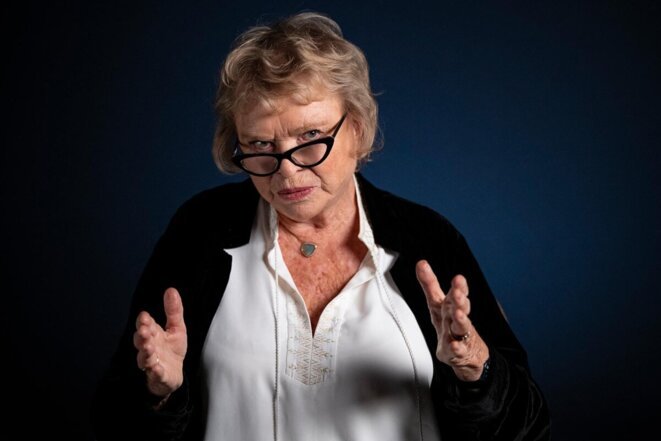France and the US lack ‘political will’ to fight corruption says former judge Eva Joly

A former investigating judge specializing in financial crime, Eva Joly also stood as the green candidate in the 2012 presidential election in France. Here she tells Mediapart of her concern at the attacks on judges after the recent conviction of Nicolas Sarkozy for conspiracy over the Libyan funding affair, and highlights the lack of effort by the media to help people understand the issues involved in that case. The ex-judge also expresses her dismay over the apathy of the French Left – and the Democrats in the United States – when it comes to issues of corruption and public probity.
Mathieu Dejean and Michel Deléan
2 October 2025 à 12h42
- Shareby copying the link to the page
2 October 2025 à 12h42
SheShe was an investigating judge in France with a high-profile role in the fight against corruption, an adviser to the government in her native Norway on the same issue, the green candidate in France’s 2012 presidential election, and also a Member of the European Parliament. Now working as a lawyer, Eva Joly keeps a watchful eye on the issue of probity in public life. In an interview with Mediapart she reveals how the row following the conviction of Nicolas Sarkozy over the Libyan funding affair – a furore which has led to death threats against the presiding trial judge – has left her pessimistic about the political and media mood in the country.
Mediapart: How do you explain the attacks against judges after the trial of Nicolas Sarkozy in the Libyan affair?
Eva Joly: As the rules forbid judges from commenting on their rulings, there was no public authority to explain the ins and outs of this 380-page ruling. There was a void, and that void was filled entirely by Nicolas Sarkozy’s defence. The speech he gave as he left the court was, in this regard, striking and very well prepared by his spin doctors. He used the tried and tested technique of playing the victim and used some unbelievable words to speak about the the judges, such as [them being] “full of hate”. I was also struck by the very sexist nature of these remarks [editor’s note, the presiding judge in the trial was a woman, Nathalie Gavarino].

So there was only one side of the case that was set out, that of the defence, and what made this worse was that journalists did not pushback in the face of these false sources of information. This is utterly deplorable and out of the ordinary. False information was thus spread. For example, Nicolas Sarkozy’s appeal does not negate the [trial] court’s judgement: one can refer to it until the court of appeal potentially changes it. There’s also a myth around the presumption of innocence, as if that changed the reality.
Lastly, an acquittal [editor’s note, on the corruption charge] was handed down because in the court’s view Nicolas Sarkozy did not hold public office at the time: he was acting as a candidate, not as a minister. [Editor’s note, read this Mediapart article for more details on the court’s reasoning.] But the facts exist!
Mediapart: In an opinion piece published in La Croix newspaper, you criticised the “blindness” of political and media commentators who play down or cast doubt on the conviction. Do you think we’ve crossed a line in public debate, to the point that we’re talking about an alternative reality?
E.J.: Yes, this goes beyond anything we’ve seen up to now, and it’s really very worrying. It’s an attack on the very foundations of our democracy. We’re used to [editor’s note, news channels] CNews or BFMTV spouting nonsense, but for the journalist Patrick Cohen [editor’s note, who works for public radio station France Inter] to join in the chorus of wailing over the criminal conspiracy [conviction] is a sign that should be taken seriously.
Mediapart: Has the climate of hate against judges also worsened since the Elf affair in the 1990s, in which you were the investigating judge?
E.J.: Yes, but things were different. In the Elf affair, it was not a president of the Republic who was facing accusations, but the foreign minister [editor’s note, Roland Dumas]. I also think citizens understood the Elf affair well, there was outrage among the public, many citizens wanted the investigation to be completed.
It’s exactly the same pattern as the Marine Le Pen case: people forget she was convicted at first instance of having misappropriated 4.1 million euros.
And with good reason: I have twenty volumes of press cuttings on this subject in my house in the country. But in the case involving Libyan funding of Nicolas Sarkozy’s campaign, there was a media black-out. Apart from Mediapart, the story was not picked up even though the facts were very serious. The public was therefore not prepared. It was as if this conviction had fallen without warning, despite the prosecution’s demand for Nicolas Sarkozy to receive a seven-year prison sentence.
Mediapart: Do you think Nicolas Sarkozy’s defence arguments really carry weight in public opinion?
E.J.: It’s hard to say, but I think there’s a background noise, an undercurrent that brands the judges as “political”, which says they “go beyond their role”. This follows on directly from the case involving Marine Le Pen [editor’s note, the key figure in the far-right Rassemblement National party] and it’s exactly the same pattern: people forget she was convicted at first instance for having misappropriated 4.1 million euros at the expense of the European Parliament (she has appealed against this ruling), that it was a theft of public funds for the benefit of those close to her, and they remember only the immediate enforcement [editor’s note, in that court judgement the trial judges ordered that the five year ban against her from standing for public office should be enforced immediately, potentially ruling her out of the next presidential election]







